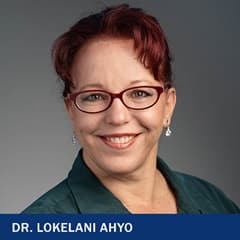Nursing's Alphabet Soup: Nursing Acronyms Explained

Know before you read
At SNHU, we want to make sure you have the information you need to make decisions about your education and your future—no matter where you choose to go to school. That's why our informational articles may reference careers for which we do not offer academic programs, along with salary data for those careers. Cited projections do not guarantee actual salary or job growth.
The acronyms nurses use to indicate their level of education, professional designations and certifications can sometimes feel more confusing than informative. It can be challenging for nurses, too, to determine how to display the credentials they've worked so hard to obtain.

There is no legal requirement for how you display your credentials, according to Lokelani Ahyo, DNP, RN, CNE, a clinical faculty member of the undergraduate nursing programs at Southern New Hampshire University (SNHU). However, she said the typical format is:
- Highest level of education
- Licensure
- Certification
- Honors
For example, Jane Smith, MSN, APRN, CNE, would be a nurse who has completed a Master of Science in Nursing, holds an Advanced Practice Registered Nurse license and is a Certified Nurse Educator.
"It is important to remember that listing credentials should balance displaying information and brevity," said Ahyo, whose own acronyms indicate that she has a Doctor of Nursing Practice (DNP), is a Registered Nurse (RN) and a Certified Nurse Educator (CNE).
Although you don't need to list all your degrees and certifications, displaying them helps to show your hard work and commitment.
"It takes a lot of time, education and dedication to become a nurse," said Ahyo. Ahyo's clinical focus as a nurse is in women's health and obstetrics, having held previous roles in perinatology and nurse management.
If you want to become a nurse and pursue a patient care specialty that most interests you, be sure to research the degrees and certifications needed to help get you there — as well as their requirements and where to obtain them.
What Are the Acronyms for Nurses?
Whether you're a nurse deciding how to note your credentials or are just curious to understand the qualifications behind the acronyms, this list can help you decipher the alphabet soup of nursing.
Note: Some of these degrees and certifications require education and other qualifications that are not offered at SNHU.
Nursing Degrees
SNHU does not currently offer nursing degrees at the associate or doctoral level.
- ADN - Associate Degree in Nursing
- BSN - Bachelor of Science in Nursing
- MSN - Master of Science in Nursing
- DNP - Doctor of Nursing Practice
Find Your Program
Types of Nurses
- ACNP - Acute Care Nurse Practitioner
- ANP - Adult Nurse Practitioner
- APRN - Advanced Practice Registered Nurse
- CCRN - Critical Care Registered Nurse
- CNS - Clinical Nurse Specialist
- FNP - Family Nurse Practitioner
- GNP - Gerontological Nurse Practitioner
- LPN - Licensed Practical Nurse
- LVN - Licensed Vocational Nurse
- NIC - Neonatal Intensive Care Nurse
- NNP - Neonatal Nurse Practitioner
- NP - Nurse Practitioner
- PMHNP - Psychiatric Mental Health Nurse Practitioner
- PMHCNS - Psychiatric & Mental Health Clinical Nurse Specialist
- PNP - Pediatric Nurse Practitioner
- RN - Registered Nurse
- SNP-BC - School Nurse Practitioner
- TCRN - Trauma Certified Registered Nurse
- WHNP - Women’s Health Nurse Practitioner
Nursing Certifications
- AACRN - Advanced HIV/AIDS Certified Registered Nurse
- ACRN - HIV/AIDS Certified Registered Nurse
- ALNC - Advanced Legal Nurse Consultant
- CBCN - Certified Breast Cancer Care Nurse
- CDN - Certified Dialysis Nurse
- CEN - Certified Emergency Nurse
- CHPCA - Certified Hospice and Palliative Care Administrator
- CRN - Certified Radiologic Nurses
- CNA - Certified Nursing Assistant
- CNE - Certified Nurse Educator
- CNL - Clinical Nurse Leader
- CNM - Certified Nurse Midwife
- CNML - Certified Nurse Manager and Leader
- CNRN - Certified Neuroscience Registered Nurse
- CNO - Chief Nursing Officer
- CRNA - Certified Registered Nurse Anesthetist
- CRRN - Certified Rehabilitation Registered Nurse
- NA - Nursing Assistant
- OCN - Oncology Certified Nurse
- ONC - Certified Orthopedic Nurse
Sources: https://www.ncbi.nlm.nih.gov and https://www.registerednursing.org/nursing-abbreviations-terms.
The Meaning Behind the Acronyms

Beyond the literal meaning of each nursing acronym is the unlocked potential that comes with them. For instance, nurse Michelle Nachand's '20 '23MSN decided to earn her Master of Science in Nursing at SNHU with the goal of elevating her career to make a more significant impact.
"I wanted to get my master's degree because I wanted to find a better way to help my patients," she said. "I wanted to be able to go into, you know, research or something higher."
In nursing, obtaining certain credentials can help you gain access to advanced or specialized roles — or additional certifications or licenses.
A degree can change your life. Find the SNHU online nursing program that can best help you meet your goals.
From the time she was a child, Ashleigh Worley '22 '25MFA found inspiration between the pages of books. Before long, she fell in love with telling stories herself. That love followed her into adulthood, leading her to earn a Bachelor of Arts in English Language and Literature from Southern New Hampshire University (SNHU). She completed her Master of Fine Arts in Creative Writing at SNHU and contributed education and career-focused blog articles as part of the university's content team. When she's not writing, she's usually enjoying time with her dad and her abundance of cats. Connect with her on LinkedIn.
Explore more content like this article

SNHU Joins Sigma, Global Nursing Honor Society

Academic Spotlight: Dr. Ashley Love, Program Director of Public Health Programs

What is Population Health Management?
About Southern New Hampshire University

SNHU is a nonprofit, accredited university with a mission to make high-quality education more accessible and affordable for everyone.
Founded in 1932, and online since 1995, we’ve helped countless students reach their goals with flexible, career-focused programs. Our 300-acre campus in Manchester, NH is home to over 3,000 students, and we serve over 135,000 students online. Visit our about SNHU page to learn more about our mission, accreditations, leadership team, national recognitions and awards.


